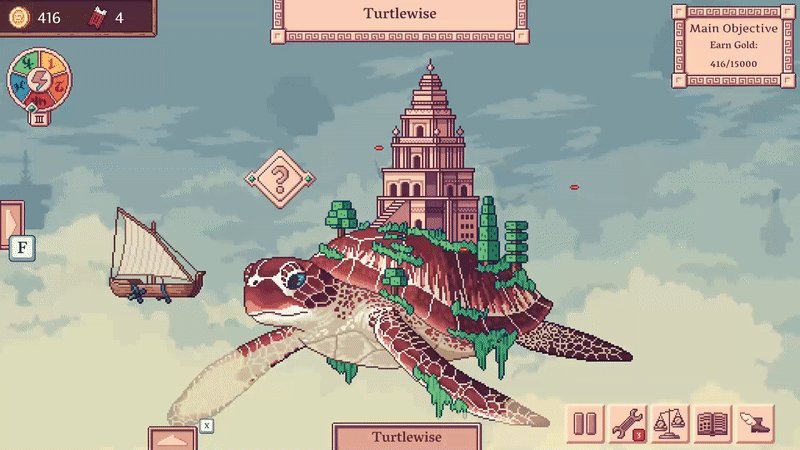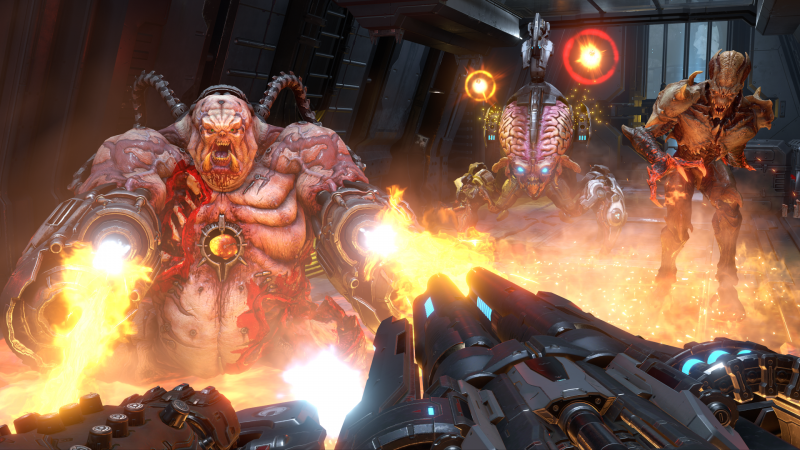I’ve played a lot of games. That’s one of the few things I feel I can state with certainty. I also feel fairly safe in the knowledge that the majority of these games feature some kind of combat. It’s a simple fact that for most of my gaming career, I’ve had to hack, slash, or blast my way to victory. I shudder to think what the combined body count must be across all those games.
I have of course also played a great number of games that are totally devoid of any violence whatsoever. Most recently, the delightful little exploration/business sim, Merchant of the Skies by ColdWild Games. It was as I was sailing peacefully through the clouds that the high octane and often brutal nature of my previous gaming escapades truly began to dawn on me.
In Merchant of the Skies, you sail merrily around the floating isles of the Fieri archipelago, seeking fame and fortune. It bills itself as an experimental game. Focused on a sense of adventure, and the feeling of building a company from nothing. So there I was. Captain of my very own airship, free to roam the skies. It felt a million miles away from my usual comfort zones of games like Dark Souls and Overwatch.
The closest I ever came to danger was when a giant octopus took my money for playing the flute wrong. But despite being in unfamiliar territory, I was completely hooked. Something about the game gripped me in a way that not many others have for quite some time. It was a totally serene experience, and yet I was on the edge of my seat.

So why do so many games fall back on combat (or at least action) for their primary loop? There are several reasons for this. From a developer’s perspective, combat gameplay is much easier to design than a lot of more abstract systems. Once you’ve got the basics together, creating new scenarios and challenges is relatively simple. It’s only a matter of environment design and enemy placement.
Computers are pretty good at simulating physics and movement in a given space. This was especially true in the past, where hardware limitations meant that simple concepts like run fast, shoot monsters became the norm. Complex dialogue, character interactions, and other systems would have been more trouble than they were worth. For this reason, shooters and platformers became the norm. A trend which has continued to this day.
Violence, and action in general, are also easy ways to create drama. The stakes are obvious, the player’s own “life” being on the line, and human beings seem hard-wired to find combat situations exciting. Most people find action and violence in some way cathartic, and so it has become almost ubiquitous in games, TV, and film. This being the case, I can understand why so many games are based around the same basic ideas. Shooting, punching and running.
It’s important to note here that I don’t mean any of this as criticism. I’ve got no problem with these types of games. I have, however, begun to wonder about what more pacifistic games, in lieu of action, do to keep players engaged. They must have to do things a little differently, and I want to work out what.
I think in order to begin our investigation, we need to discuss the basics. What is a game actually trying to do, and why do we enjoy them. In my opinion, a game is fundamentally a challenge that the player must overcome. Once again, the reason so many games rely on violence is that it offers an obvious and immediate obstacle for the player. The challenge comes from the bodies between you and your objective. Going the nonviolent route requires a slightly different approach.
When it comes to concepts like “challenge” and “difficulty”, I like to think of all games existing on the same spectrum. At one extreme we have “execution” based games (typically FPS, platformers, racing games, etc) and at the other, “solutions” based games (Puzzle, Strategy, etc).

So at the molecular level, both Merchant of the Skies and Doom (the first shooter I could think of) are offering the same experience. Both are about overcoming obstacles on the path to achieving a given goal. Kill all the demons, or get rich quick. The key difference is in the means by which the player must succeed.
In Doom, forethought and strategy are certainly helpful, but if you’re no good with a gun, you aren’t going to get very far. Conversely, even the twitchiest of twitch reflexes will get you nowhere in a game where careful planning, financial acumen, and business savvy are the order of the day. Brains over brawn if you will.
This is all fairly basic stuff really. It’s a simple matter of designing games and scenarios which demand something different from the player. Then it’s only a matter of working out what kind of challenge people enjoy facing. Do you want your player to feel smart or powerful?
There is however a more subtle point to take away here. I said that all games exist on the same spectrum for a reason. There is a common element all games share, which if removed, would change the experience completely, almost certainly for the worse. Whether unloading another shipment of apples on some far off island or unloading my shotgun shells into a demon’s face, one thing remains constant. Context is everything.
To go back to an earlier example, what would Doom be without all the little things that make it “Doom”? Strip away the demons, the blasted hellscapes, the BFG, and the Doomslayer himself, and what are you left with? Probably not anything that’s going to set the world alight.
You can do the same thing to Merchant of the Skies. It just wouldn’t be the same without the airships, the flying turtles, and gorgeous vistas, all the stuff I fell in love with. The sense of adventure just wouldn’t be there. The identity of the game would be completely lost. I enjoy playing both games, but the moment to moment stuff isn’t what really got under my skin.

I’ve realised that I need a reason to take on the challenges a game offers. I don’t want to sit inside a skinner box or run an obstacle course. I want to feel as if my actions, my solutions have real meaning. This is probably why the whole “modern warfare” craze never really got to me. I simply never felt that all-important connection. Shouting, patriotism, and misery never really appealed to me. Even if the gameplay was beyond reproach, I’d never be a true Call of Duty fan. I would enjoy it on a superficial level, but it would never earn its place in my heart the way something like Bloodborne did.
While that may have just been an elaborate way of announcing that “I enjoy games”, I think my point is still valid. I see too many games without an identity of their own. People will forgive a hell of a lot if you can add a bit of charm. Just look at something like Shenmue, which attracts a positively rabid fanbase, despite (whisper it) not being a very good game. The gameplay does of course come first, but to really create something special, you need something a little less tangible, a sense of identity.
Merchant of the Skies on Steam
- Gaming Critics & Critiques: Consistent Voices - January 1, 2022
- On Photography: Humans, The Elusive Subjects - November 21, 2021
- Why Gaming’s Attempt to Copy The Oscars Makes Me Nervous - October 20, 2021
